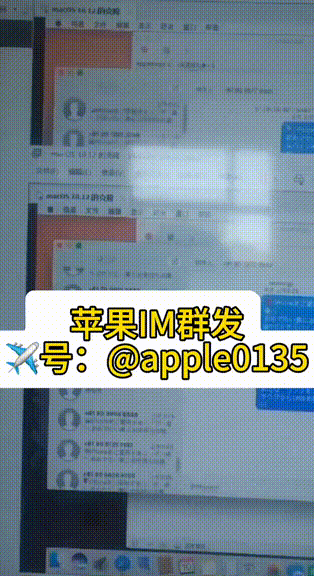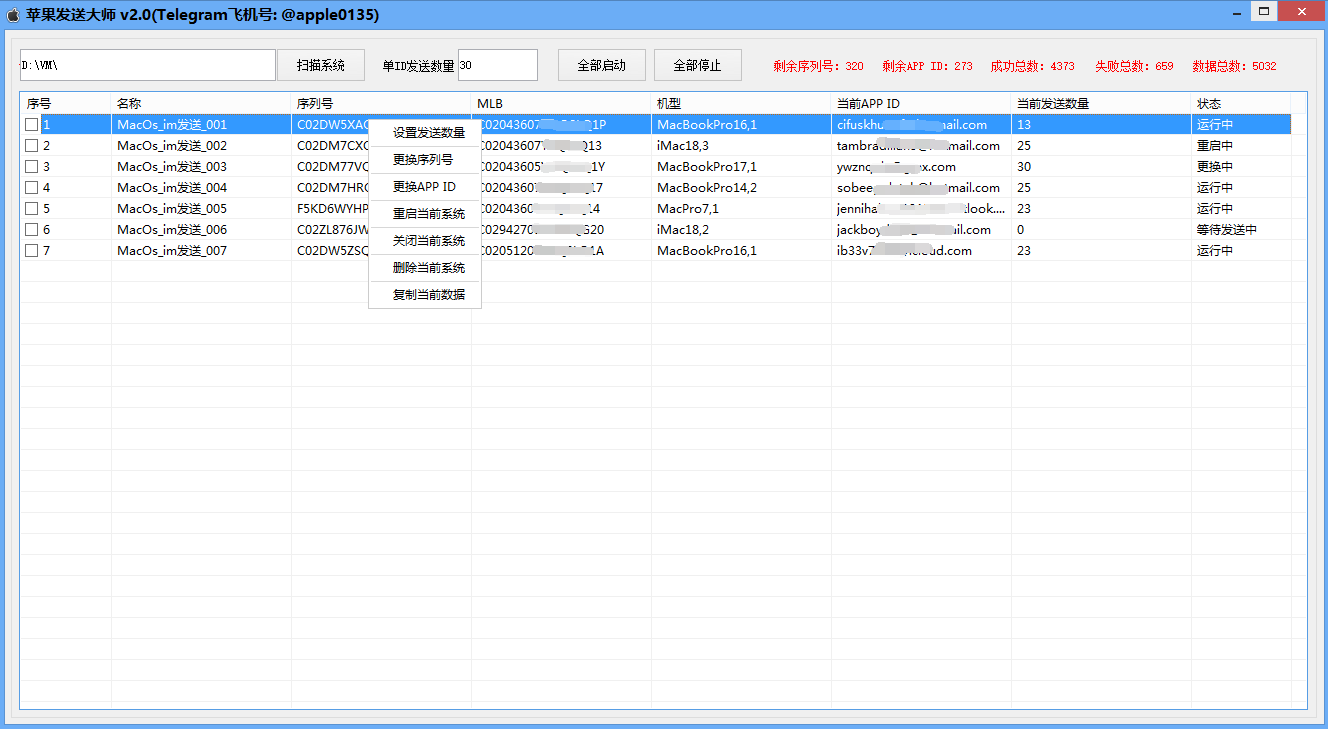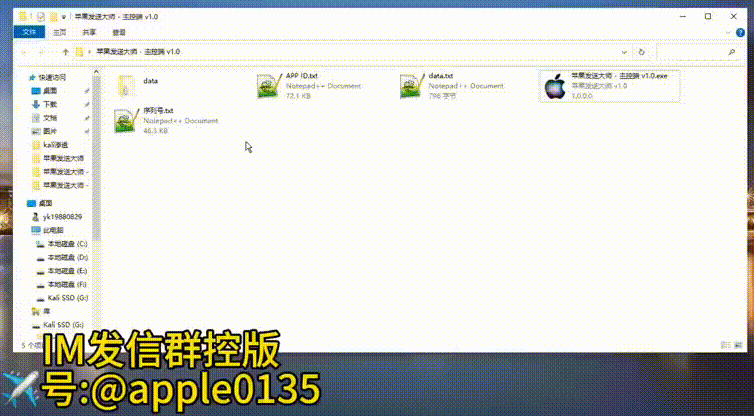苹果iMessage群发,苹果iMessage短信,苹果iMessage推信,电脑版Mac Os系统自动群发iMessage完美实现 - 电脑升级版
一、PC电脑版苹果系统(Mac OS)上实现imessage群发总结为以下几种方式:
/*MacOS苹果系统,正常情况下,只能安装到苹果公司自己出品的Mac电脑,俗称白苹果,不能安装到各种组装机或者其他品牌的品牌机上,黑苹果的的原理,就是通过一些 “破解补丁” 工具欺骗macOS系统,让苹果系统认为你的电脑其实是一台苹果电脑,从而可以安装运行。*/1.品牌苹果笔记本或苹果一体机(俗称正品品牌苹果系统),通过群发脚本调用苹果电脑系统下的imessages应用来实现自动群发imessages短信
优点: 只需要群发脚本代码即可实现群发,无需其他任何操作。
缺点: 如果发送的较多,官方会封ID或设备串码(序列号、主板序列号、UUID等设备串码),一旦设备串码被封,苹果电脑下很多应用都无法使用,得不偿失,解封很麻烦(解封需要电联官方解封)。
2.U盘安装法,刻录U盘进行安装是主流选择,这样安装调试好的黑苹果Mac os问题最少,也较为稳定: 下载黑苹果安装镜像 → 刻录到U盘 → 调整配置文件 → 格式化准备好的硬盘 → 重启修改BIOS设置 → 使用U盘引导 → 安装黑苹果到目标硬盘 → 进入系统后调试
优点: 安装在windows系统的PC硬件电脑上的黑苹果系统通过特定工具及技术洗成白苹果后,完全和Mac笔记本或苹果一体机拥有完全一样的功能。发送数量也大大提高。
缺点:需要具备U盘制作启动盘相关技术知识,并将苹果系统安装在英特尔或者AMD架构的硬件上,并使用相关工具注入五码(序列号、主板序列号、UUID等设备串码、MLB、ROM)洗成白苹果。
3.镜像恢复法,在Windows下使用镜像恢复软件安装:下载恢复版镜像 → 重启修改BIOS设置 → 安装镜像恢复软件 → 格式化准备好的硬盘 → 拷贝EFI文件 → 执行镜像恢复 → 添加UEFI启动项 → 进入系统后调试。
优点: 安装在windows系统的PC硬件电脑上的黑苹果系统通过特定工具及技术洗成白苹果后,完全和Mac笔记本或苹果一体机拥有完全一样的功能。发送数量也大大提高。
缺点:需要具备相关技术知识,并将苹果系统安装在英特尔或者AMD架构的硬件上,并使用相关工具注入五码(序列号、主板序列号、UUID等设备串码、MLB、ROM)洗成白苹果。
4.Windows下通过安装Vmware虚拟机,通过OpenCore或Clover Configurator引导工具制作EFI来引导安装Mac OS黑苹果到VMware,通过特定技术洗白苹果后,通过脚本全自动实现批量群发。
优点: 安装部署起来简单方便,批量克隆复制多个Mac Os系统,随时更换设备串码(序列号、主板序列号、UUID等设备串码)等来解封从而达到使用Imessages
缺点:需要根据CPU,主板,显卡等硬件定制对应EFI启动文件,并且进入系统后使用OC或CC工具正确的注入三码后使用imessages(解封方便,使用者随时可以自行使用相关工具来生成新的串码来更换设备串码解封设备)
5.黑苹果正确的注入序列号,避免封号,解锁iCloud、 FaceTime、iMessage
(1)什么是苹果序列号?
苹果的生态是一套完整的闭环,每一个苹果硬件产品都有独一无二的序列号、主板序列号和 UUID,它们都有和机型ID对应的编码规则,这点是非常确定的,所以三码不能胡乱套用,换句话说,不论是本地电脑U盘安装苹果系统、镜像恢复安装苹果系统、Vmware安装苹果系统,你所安装的苹果系统都必须和你当前电脑的机型、CPU架构、主板、显卡等硬件配套,并且与机型 ID 匹配。否则你将无法使用App id激活iMessage、FaceTime、App Store等应用 或 App id登录iMessage应用后提示鉴定错误、激活后闪退、激活imessage后无法发送、发送几封后无法送达等等问题。
(2)解决一些苹果服务(iCloud/App Store/FaceTime/iMessage/随航)不能正常使用方面的坑
1)安装苹果系统的怎么无法登陆app id,使用id激活imessage就提示鉴定失败?
2)iMessge群发是不是风控了,无法发送了?
3)安装的苹果系统怎么发送几封就无法发送或发送失败了?
4)安装苹果系统的怎么无法修改三码或五码?
5)安装的Mac os系统修改设备串码(3码或5码)后,无法激活imessage或激活后发送几封就失败?
鉴于以上问题,笔者给出肯定的答案,一直是可以发的,鉴于出现以上问题,分析得出:
1)你所安装的黑苹果系统与你的电脑硬件(主板、CPU、显卡等硬件)不符。
2)你的电脑硬件配置上所安装的黑苹果系统与正品Mac的机型ID不符
3)你安装的Mac os系统注入的设备串码(五码)不匹配
4)你所安装的黑苹果系统是否支持NVRAM
系统是否支持NVRAM,取决于主板。NVRAM在黑苹果中有及其重要的作用,第一,是用于重启后保存与蓝牙、屏幕亮度、系统音量、iMessage、FaceTime等相关参数;第二,Clover和OpenCore需要NVRAM支持才能支持系统启动磁盘设置(例如Bootcamp功能);第三,用于支持NVIDIA Web Driver Manager等相关功能。配置功能完善的NVRAM,会让你的黑苹果系统完善,较白苹果来讲上述功能几乎没有区别。总之一句话,NVRAM 对于苹果服务能否正常工作至关重要。
(3)注入三码或五码与你的机型不符 (苹果官网序列号验证结果: https://checkcoverage.apple.com/?locale=zh_CN)
结果一:等同于查无此人,代表此序列号不存在于苹果的产品序列号库中,这个类型的序列号是黑苹果可以使用的;
结果二:有效的已激活的白苹果序列号,其指向一台已正常销售并激活使用的白苹果Mac,建议黑苹果不要使用,因为黑苹果经不起验证,可能导致你的账号出现问题
结果三:有效的未激活的白苹果序列号,其指向一台未激活使用的白苹果 Mac,推测可能是质检未过,弃用,未销售,未联网,或者还没激活就意外损坏。总之这个序列号存在对应的产品,但没在苹果的数据库里激活过。这种类型的序列号也是黑苹果可以使用的.
分析如下:
1)“很抱歉,这个序列号无效。请检查您的信息并再试一次。” 这个类型的序列号适合绝大部分拥有「良好记录的 Apple ID」的用户使用,但如果你的 Apple ID 信用/记录不佳,你需要第三种类型的序列号;
2)白苹果的序列号一般情况下不建议使用,因为它已经在苹果的数据库中激活了,你根本不清楚这台白苹果的使用情况,它可能随时会接入互联网,也可能随时回像苹果公司的服务器请求数据,所以使用白苹果的序列号可能会导致一系列问题,最糟糕的情况是 Apple ID 被拉上黑名单。但是,已激活的白苹果序列号可能会帮助记录相对空白的新 Apple ID 在黑苹果中初次登陆,但从长远来看,另外两种才是更好的选择;
3)根据第三种序列号对应的情况,比较推荐使用老机型 SMBIOS ID 和 Apple ID 有问题的用户使用,针对使用老机型(已停产或销售2年及以上机型)的情况比较好用,因为已停产但未激活的Mac,十有八九是出了问题,大概率是不会激活入网了,因此翻车概率较低。最终使用哪种方法获取序列号,请自行斟酌,风险自担。
二、iMessage群发
/*我们都知道imessage群发脚本只是代替人工手动操作而已,重点核心在于如何拥有一个廉价的苹果系统能使用,安装的苹果系统能像正品的苹果电脑系统一样,新ID或老ID都可以直接激活iMessage、FaceTime、APP
Store等应用,能正常使用苹果系统下的各类应用。并可以防封ID */
1.自动群发是脚本自动调用苹果系统上的Imessages应用,脚本控制iMessage客户端全自动发送。
iMessage自动群发协议代码:(根据不同电脑的CPU,主板,显卡等硬件定制的系统、配套工具、串码修改工具、群发程序、全套可实现防封ID,单ID无限制,新老ID皆可激活使用imessage,有需要可联系)
set successCount to 0
set errorCount to 0
tell application "Messages"
with timeout of 8 * 3600 seconds
set phoneFilePath to my current_folder_path() & "phoneNumber.txt"
set phoneData to read phoneFilePath
set phoneEntries to paragraphs of phoneData
set phone_nums to count phoneEntries
repeat with i from 1 to count phoneEntries
-- *******************************************
-- 拼接发送的短信文本内容
-- *******************************************
set msgText to (my AppendFace("hello,")) & my AppendFace("下午好啊") & my AppendFace("张三")
set phone to (phoneEntries's item i)'s text
set targetService to (1st service whose service type = iMessage)
set theBuddy to buddy phone of targetService
set num to the length of phone
set isEmail to true
if ((num > 0 and (my isSendPhone(phone)) = false) or isEmail) then
try
send msgText to theBuddy
set logText to phone & " *** " & "1" & " *** " & date string of (current date) & " " & time string of (current date) & " *** " & "发送成功
"
---延时,不然取不到已发送的状态
delay (random number from 1 to 3)
set chatNum to (get count of chat)
if (chatNum >100) then
my deleteMsg(chatNum)
end if
my WriteLog(logText)
my WritePhone(phone)
set successCount to successCount + 1 -- 记录成功数
on error errorMessage number errorNumber
set logText to phone & " *** " & "0" & " *** " & date string of (current date) & " " & time string of (current date) & " *** " & "发送失败
"
my WriteLog(logText)
log "捕获的异常:" & errorMessage & "异常的编号:" & errorNumber
set errorCount to errorCount + 1 -- 记录失败数
end try
end if
end repeat
set titleStr to "数据总数:" & phone_nums & "个 " & "发送成功:" & successCount & "个 " & "发送失败:" & errorCount & "个"
set btns to {"知道了"}
display dialog titleStr buttons btns default button 1 --默认选择第1个按钮(按return时就会让弹出框消失)
get the button returned of the result -- 弹出框
end timeout
end tell
on deleteMsg(maxNum)
tell application "Messages" to activate
tell application "System Events"
tell process "Messages"
tell window 1
repeat's maxNum times
delay 0.5
click row 1 of table 1 of scroll area 1 of splitter group 1
delay 0.2
click menu item "删除对话…" of menu "文件" of menu bar item "文件" of menu bar 1 of application process "Messages" of application "System Events"
delay 0.2
try
click buttons "删除" of sheet 1
end try
end repeat
end tell
end tell
end tell
end deleteMsg
on AppendFace(msgText)
set face to my RandomFace()
set content to face & msgText & "
"
end AppendFace
on RandomFace()
-- 表情数组
set faceList to {"🐟", "🦐", "🦀️", "😊", "😂", "😄", "🎆", "🎉", "🍺", "💐", "🌹", "🦈", "🐲", "🐢", "🐳", "🐬", "🐚", "💰", "🎁"}
set face to item (random number from 1 to count faceList) of faceList
return face
end RandomFace
on isSendPhone(the_phone)
set num to the length of the_phone
if (num = 11) then
set fileName to date string of (current date)
set logFilePath to my current_folder_path() & "send/" & fileName & ".txt"
set this_file to (POSIX file logFilePath as string)
set this_story to the_phone & "
"
try
set fp to open for access this_file
set myText to read fp
if (myText does not contain the_phone) then
return false
else
return true
end if
on error
return false
end try
end if
end isSendPhone
on WritePhone(the_phone)
set num to the length of the_phone
if (num = 11) then
set fileName to date string of (current date)
set logFilePath to my current_folder_path() & "send/" & fileName & ".txt"
set this_file to (POSIX file logFilePath as string)
set this_story to the_phone & "
"
try
set fp to open for access this_file
set myText to read fp
if (myText does not contain the_phone) then
my write_to_file(this_story, this_file, true, true)
end if
on error
my write_to_file(this_story, this_file, true, true)
end try
end if
end WritePhone
on WriteLog(the_text)
set fileName to date string of (current date)
set logFilePath to my current_folder_path() & "log/" & fileName & ".txt"
set this_file to (POSIX file logFilePath as string)
my write_to_file(the_text, this_file, true, false)
end WriteLog
on write_to_file(this_data, target_file, append_data, append_end)
try
set the target_file to the target_file as text
set the open_target_file to ¬
open for access file target_file with write permission
if append_data is false then
set eof of the open_target_file to 0
write this_data to the open_target_file starting at eof
else if append_end is false then
try
set fp to open for access target_file
set myText to read fp
set eof of the open_target_file to 0
write this_data to the open_target_file starting at eof
write myText to the open_target_file starting at eof
on error
write this_data to the open_target_file starting at eof
end try
else
write this_data to the open_target_file starting at eof
end if
close access the open_target_file
return target_file
on error
try
close access file target_file
end try
return false
end try
end write_to_file
on current_folder_path()
set UnixPath to POSIX path of ((path to me as text) & "::")
return UnixPath
end current_folder_path
2.单台windows电脑多开多个苹果(Mac os)系统同时群发:根据上面的代码自行更改更加强大的全自动发送脚本,改良后如下:(发送的三种模式:1.纯文字内容,2.纯图片内容,3.文字+图片内容组合)

3.windows电脑版主控端群控软件(每台Mac Os系统都安装被控端脚本,主控端一键扫描本机或同局域网上部署的Mac OS系统,单ID设置发送指定数量iMeessage信息后,群控智能全自动给苹果系统更换序列号、更换app id、自动重启系统和脚本等...)

群控端预先导入发送的数据,APP ID,序列号数据后;设置好相关参数启动即可全自动控制所有部署的苹果系统进行自动重启系统,自动更换序列号,APP ID进行发送.

三、AMD或者英特尔架构的电脑上安装的黑苹果系统(Mac os)或Vmware下的黑苹果系统iMessages群发短信注意事项:
1.黑苹果Mac Os系统通过正确的方法洗白苹果后,App Store iMessages 和FaceTime 可用
/* 如果登陆app store过程一直在转圈的情况,或imessages一直无法激活的原因是:app store 会检查机器的smbios 信息,如果不是 mac 机器,就不让登录。*/
(1) Clover configurator 或OpenCore制作引导EFI文件后。正确的写入设备串码到系统。(黑苹果正确的注入串码,设备串码不能胡乱套用,必须和你当前电脑的CPU、硬件、显卡等硬件息息相关并且还与机型 ID匹配。)
(2) 登录“偏好设置-icloud” 或直接登录imessages时正确输入app id账号信息。
(3)记录良好的 Apple ID:App Store 和 iMessage
没有黑历史;账号注册及使用时间越长越好;账号下绑定了多个苹果设备并且有 App Store 的消费记录就更好了。有了这种 Apple
ID,各类苹果服务不能用的情况绝不会在你这里出现。



